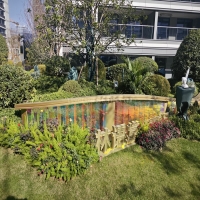Welcome to the website for landscape facilities products and knowledge.
How does the trash can’s design ensure it is easy to identify the type of waste it is intended for?
Modern trash can designs prioritize ease of waste identification to encourage proper waste segregation and recycling. One of the most effective methods is color coding, where different colors represent specific waste types—blue for paper, green for glass, and black for general waste. This visual cue helps users quickly identify the correct bin without confusion.
Additionally, clear labeling with symbols or text further enhances clarity. For example, a bin labeled "Plastic Only" with a recognizable recycling symbol ensures users dispose of waste correctly. Some designs even incorporate pictograms or multilingual labels to cater to diverse populations.
The shape and size of trash cans also play a role. Dedicated bins for bulky items like bottles or cans often feature narrow openings to prevent misuse. Meanwhile, smart bins with sensors or voice prompts are emerging, guiding users in real time for accurate waste disposal.
By combining color, labeling, and innovative features, trash can designs make waste identification effortless, promoting sustainability and cleaner environments.
Related search:

Recommendation
Metal and acrylic color-changing combined curtain wall for large-scale public landscape facilities